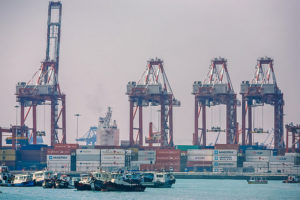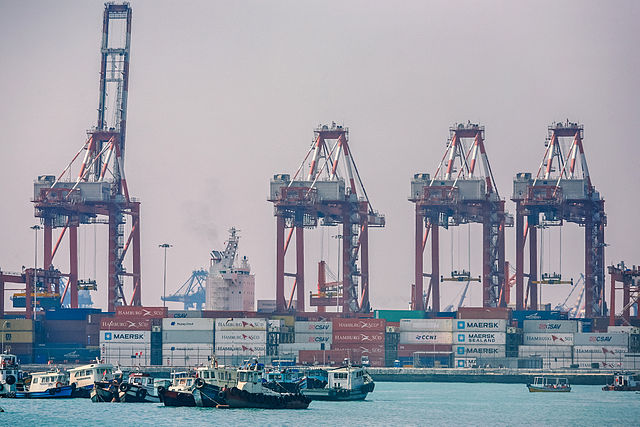 The economic slowdown in the advanced economies is the biggest drag on global growth, and developing countries are now caught in the downdraft, according to the latest UNCTAD Trade and Development Report.
The economic slowdown in the advanced economies is the biggest drag on global growth, and developing countries are now caught in the downdraft, according to the latest UNCTAD Trade and Development Report.
The loss of economic momentum in the advanced economies is having knock-on effects on developing countries, which will grow on average less than 4% this year, some 2.5 percentage points below the pre-crisis figure, said the annual report. Considerable regional variations mean that while Latin America is in recession, Asia continues with slower but steadier growth.
Slower growth in developing economies compounds concerns for the global economy. In 2016, global growth will likely drop to just 1.5% this year, below the 2.5% figure registered in 2014 and 2015, and UNCTAD economists said they would not be surprised if it dropped further.
“Policymakers all around the world face a difficult combination of sluggish investment, productivity slowdowns, stagnant trade, rising inequality and mounting levels of debt. Solutions require an ambitious rethink, not a tepid business-as-usual reaction,” said UNCTAD Secretary-General Mukhisa Kituyi.
Growth in the U.S. is expected to slow to 1.6% this year, close to the Eurozone growth rate, while in Japan, growth continues to stagnate. In the UK, revived growth will be cut short by the decision to leave the European Union, though the report said it is still difficult to predict the gravity of the Brexit impact.
The Geneva-based body said that “the lack of global demand and stagnant real wages are the main problems behind the slowdown in international trade. But if policymakers fail to mitigate the negative impacts of unchecked global market forces, then a turn to protectionism could trigger a vicious downward cycle affecting everyone.”
Advanced economies can help kick-start sustainable global growth by combining proactive fiscal policy, including on infrastructure spending, with supportive monetary policy and redistributive measures too, the UNCTAD report said.
Redistributive policies include income policies, minimum wage legislation, progressive taxation and welfare-enhancing social programs tailored to local circumstances. Such policies can also lead efforts to regulate against global and corporate financialization.
Developing countries should build domestic demand, use regulation to protect themselves from the risks of financialization in their domestic contexts and protect their policy and fiscal space to manage any unforeseen shocks, the report added.
Many of these measures will require better policy coordination at the international level, particularly among systemically important economies in the Group of 20.
Playing catch-up
According to the report, catching up is not getting any easier for developing countries. Some regions, notably East Asia, have successfully boosted productivity and incomes by developing strong manufacturing export sectors. But raising the share of manufacturing in gross domestic product above 30% has not been replicated elsewhere, not even in their neighbors in the Southeast, the report observed.
Elsewhere industrialization has stalled, with middle-income countries finding it increasingly difficult to move to the next level. In several cases, “premature deindustrialization” has taken place, often triggered by drastic policy changes that place undue faith in markets. In such cases, long periods of productivity stagnation or decline have coincided with declining shares of manufacturing value added and employment, and sharp falls in investment growth, particularly in the public sector.
In 2014, Asia alone accounted for 90% of manufacturing exports from developing countries to the world and for 94% of South–South trade in manufactures. Countries from East and Southeast Asia in particular have been able to generate significant value added from their export of manufactures.
“However, this model is looking less assured,” the report said. “Weak aggregate demand around the world has made export markets more crowded and competitive. Downward pressure on prices and wages has hit even the most successful Asian exporters. Job creation has stalled, notably among women.”
Upgraded technology or economies of scale in selective industries can offer solutions. But the spread of global value chains, where a sector’s leading firms carry significant bargaining and pricing power, makes it challenging for developing country firms to enter markets in economically consequential ways, while any productivity increases drain abroad through lower prices.
Developing countries will need strategic policies to enhance their production, design and marketing capabilities in order to enter developed-country markets. Development-oriented competition policies and rules can also help nurture domestic producers. But global support to track sectoral trends in different segments of value chains and monitor restrictive business practices would also be helpful.
In addition, regional markets and South-South trade offer new export opportunities; however, a more balanced growth strategy would require attention to strengthening local markets.
UNCTAD contends that conventional policy advice on structural reforms, which often combine an overvalued currency and wage repression, will not contribute to deliver sustainable outcomes.
Shifting to higher valued added
The more challenging global environment means that developing countries cannot count on a swift return to the rapid growth enjoyed in the first years of the new millennium. Solutions will require ambitious but pragmatic responses, including a shift of resources towards more diversified and higher value added activities.
Industrial policy has always involved the selection and support of key sectors, but this year’s Trade and Development Report argued for a more sophisticated approach, including the construction of linkages and capabilities to build a production base fit for purpose in a rapidly changing world where sufficient space is available for experimenting and learning, both in the public and private sectors.
This is not only a matter for developing countries, with developed countries struggling to address post-industrial worries over secular stagnation and a hollowing out of the middle classes.
The report calls for policymakers to be more pragmatic, learning from both successes and failures.
Capable and stable government institutions, along with adequate public resources, matter. But dialogue between government and business is also essential for the exchange of information and building trust. Importantly, the state should also be willing and able to withdraw or withhold financial support in case of underperformance by business.
The report calls for a less ideological discussion of targeting support while also recognizing that standalone industrial policies are unlikely to deliver. Instead, the key to success lies in the effective integration of macroeconomic, financial, trade, and industrial policies, it said.
Photo: Alex E. Proimos





